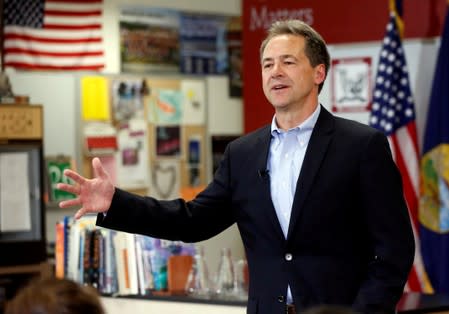Democrat Bullock seizes spotlight after getting left out of presidential debate
(The story corrects the polling number the Democratic National Committee will consider for Bullock for the next debate to 1% instead of 2% in paragraph 18.)
By Sharon Bernstein
(Reuters) - Montana Governor Steve Bullock is making a flurry of appearances on television and the campaign trail after getting locked out of next week's Democratic Party presidential debate, a move aimed at turning the bad news into a boost for his candidacy.
While 20 of his rivals meet over two nights on the debate stage in Florida, Bullock will be in Iowa and New Hampshire - the first states to have presidential nominating contests - holding televised town halls. A new ad being released on Tuesday and seen by Reuters complains that Bullock was "ousted" from the debate and urges supporters to donate to his campaign.
After failing to meet the polling or donor thresholds for the first debate of the 2020 Democratic nominating competition, Bullock will have to work hard to recover from the blow of missing a major moment in the national spotlight, political experts said.
But the attention around his predicament has raised the profile of the Democratic governor, who won election in a state that backed Republican Donald Trump by more than 20 percentage points - and could help him, at least temporarily, stand out in the crowded field.
"Maybe he gets on TV to whine about the debate, but he uses the rest of the time to say, 'Here's what I stand for,'" said Larry Sabato, director of the Center for Politics at the University of Virginia. "Then suddenly people start paying attention. Democratic activists will actually know who he is."
Bullock's decision to stay out of the presidential race until after the Montana legislative session ended left him with just a month to meet his party's requirements for participating in its first debate, to be held June 26 and 27 in Miami.
To qualify, candidates had to either raise money from 65,000 donors, or score 1% or more in three opinion polls acceptable to the party. Bullock and three other candidates - former U.S. Senator Mike Gravel of Alaska, U.S. Representative Seth Moulton of Massachusetts and Wayne Messam, mayor of Miramar, Florida - did not make the cut.
Bullock's campaign has argued privately and publicly with party officials that a poll rejected for allowing respondents to name their own candidates instead of choosing their favorite from a list should be allowed, opening up a slot for Bullock.
But Democratic National Committee spokeswoman Xochitl Hinojosa said the party told Bullock months ago that the poll did not meet its qualifications.
"We notified the Bullock campaign several times beginning in March that this poll would not count because it was open-ended and not a traditional horse-race question," she said.
DECISION BRINGS ATTENTION
After learning last week for certain that he would be left off the debate stage, Bullock's campaign put into motion a strategy advisers said was months in the making.
In an online ad to be released on Tuesday, a young woman criticized the party for excluding Bullock and asked supporters to donate to his campaign.
"Let's stand up for him," she said.
Taking the candidate's case to the public through old and new media has resulted in more coverage than Bullock would have received had he simply been admitted to the debate stage, campaign adviser Matt McKenna said.
"The DNC's decision to exclude him from the first debate is getting attention from the kinds of voters who understand exactly where we need to win in 2020 to take back the White House," McKenna said.
Bullock also plans to crisscross early voting states in coming days, with numerous events planned in Iowa, New Hampshire and California.
To keep his campaign viable, Bullock will need to make sure to be included in the second and third sets of debates, planned for July and September, Sabato said.
A CBS News poll released this weekend that showed Bullock polling at 1% would be acceptable for the party's debate in July, Hinojosa said.
But she did not confirm he would make that stage, citing the party's complicated rules for inclusion. If more than 20 candidates amass poll numbers high enough to be included, the party also will consider their fundraising efforts, favoring those who also met that standard.
The low early polling numbers that kept Bullock off the first stage will be tough for the cowboy boot-wearing governor to overcome, predicts political analyst Sherry Bebitch Jeffe, a retired professor of public policy at the University of Southern California.
"Perception of his inability to get one percent of the vote can only hurt him, no matter what he does," she said.
(Reporting by Sharon Bernstein; Editing by Colleen Jenkins and Jonathan Oatis)


